The Laws of Parking

The frustration of not being able to find a parking space is all too familiar for motorists. So, when desperate times call for desperate measures, are you actually parking within the law? This section takes a closer look at the laws surrounding parking.
In the UK, there’s an almost bewildering range of signage that dictates where we can and cannot park. In fact, sometimes it seems like there isn’t that much of a difference between the various lines and signs we see every day. In this tab we offer:
- A simple visual guide to where not park
- Information on the legality of pavement and driveway parking
- Blue Badge rules
- Parking zone information
A visual guide to where you cannot park

Double yellow line
No parking at any time of day
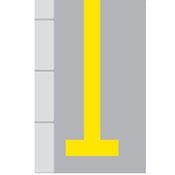
Single yellow line
Restricted parking during certain times of day: check the accompanying sign

Yellow lines with double kerb ‘blip’
In addition to parking restriction, loading is not permitted

Yellow lines with single kerb ‘blip’
In addition to parking restriction, loading is not permitted between times indicated by sign

Double white line
No parking at any time, except to drop off passengers
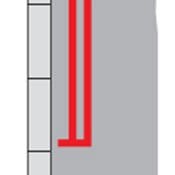
Double red lines
No parking, loading or boarding at any time
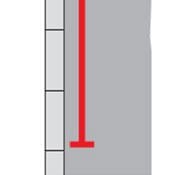
Single red lines
No parking, loading or boarding during times indicated by sign
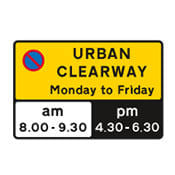
Clearways
No parking in the clearway zone between the times indicated

Cycle lane
No parking at any time
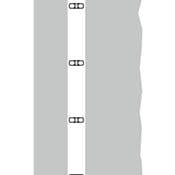
Motorway hard shoulder
Emergency parking only

Tramways
No parking during period of operation

Pedestrian crossings or zig-zags on the approach
No parking at any time
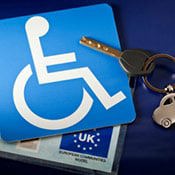
Blue Badge bays
No parking without a valid Blue Badge

Access routes for emergency vehicles and yellow zigzags at school entrances
No parking at any time
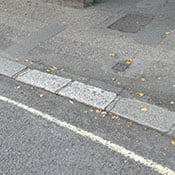
Dropped kerbs, across pavements or on verges
No parking at any time (though the illegality of any of these may depend on the local authority)
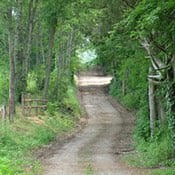
Privately owned land without signage
Assume that it is not legal to park
Parking on the pavement
Some motorists may be surprised to hear that parking on the pavement – even partial parking – is actually in contravention of the Highway Code. Section 244 specifically prohibits pavement parking in London, but essentially suggests a blanket ban – ‘unless signs permit it’. Enforcement of this section of the code varies from council to council, however: the Highway Code is ultimately a guide book rather than a document describing traffic law.
It’s important to be a considerate motorist, and for your own safety and the safety of other people, we do not recommend pavement parking. Parking on pavements in areas with high pedestrian traffic is especially problematic: you’re forcing pedestrians onto busy roads, and you are putting your passengers in danger also.
Parking in front of a driveway
Similar to the above, the Highway Code describes parking in front of a dropped kerb used for a driveway as a violation. Legally, the Highway Code itself doesn’t necessarily have any weight in the matter, but under The Road Vehicles (Construction and Use) Regulations 1986, section 103, you may be towed or fined for causing an obstruction.
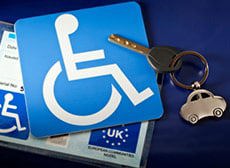
Blue Badges
In the UK, the Blue Badge scheme allows people with severe walking disabilities, the registered blind and those with severe upper body disabilities, to park more freely through usually restricted zones. Applications for blue badges are handled by Gov.uk and your local authority. Blue Badge holders can park:
- On single and double yellow lines for up to three hours
- For free at council-owned pay and display car parks
- Indefinitely on a dotted yellow line
- In Blue Badge bays
However, it must be noted that the Blue Badge applies to the holder rather than their vehicle: the badge must be displayed at all times, but it cannot be used by carers if the holder is not present. Other limits to the Blue Badge scheme are detailed in our parking myths section.
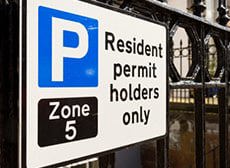
Parking zones and permits
In a country that is increasingly urbanised, with denser populations and more cars, parking has become a problem. The lucky few who have a driveway may not even have enough space for every vehicle in the family, and everybody else has to make do with on-street parking. To deter (and monetise) vehicle ownership in many UK cities, local governments have created parking zones, requiring residents, visitors and local businesses to apply for permits.
These permits allow for parking in bays within the applicable zone. There may be concessions for businesses, carers and electric vehicles, but everyone else without the relevant permit will find themselves unable to park in that zone, liable to face a fine if caught by a local traffic warden. The alternative is to park your vehicle in a nearby car park, or there may be a ‘pay and display’ machine for certain permitted bays, or else use public transport. For information about parking zones in your city, find your local council via the Gov.uk website.
“Finding a parking space is stressful enough without worrying about potential restrictions. Help avoid unnecessary fines by planning ahead, checking signage when you arrive and ensuring you park sensibly within the allocated bays.”

In this section, we examine some commonly held beliefs about parking law in the UK:
- You can park anywhere you want on a bank holiday
- Private car park owners can fine you
- Private car park owners can clamp you
- Single yellow lines have the same restrictions everywhere
- Blue Badge holders can park anywhere
- A parking ticket actually expires three minutes after its stated expiry time
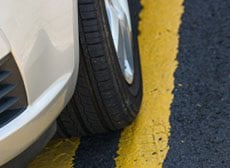
Myth: You can park anywhere you want on a bank holiday
It is often widely assumed that bank holidays mean free access to resident’s bays and streets with yellow lines. Certain councils have set this precedent and it is a common assumption that parking enforcement officers aren’t working on bank holidays. In reality, many councils enforce bank holiday parking, sometimes with staff and sometimes with automated systems. Always check with the local council before you travel.
Myth: Private car park owners can fine you
Private car park owners cannot issue fines, though the document you receive will often be dressed up and worded in such a way that they look like fines. They can in fact only issue invoices, essentially for breach of contract.
This doesn’t mean that private car park owners can’t charge you for parking on their land, or attempt to reclaim money if you fail to pay. It does mean, however, that they cannot legitimately demand money and expect payment through the issuing of the notice alone: contract law means they have to take you to court first.
In practice, private car park owners sometimes fail to bring matters to court, and even when they do their ‘contracts’ are often unenforceable: there is allegedly a high success rate for people who challenge their tickets. We do not endorse this course of action.
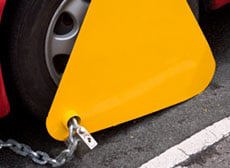
Myth: Private car park owners can clamp you
It became illegal to clamp, tow or block in vehicles on private land in October 2012, specifically to combat illegal acts by private car park owners. If your vehicle is clamped in such circumstances, you have the right to call the police.
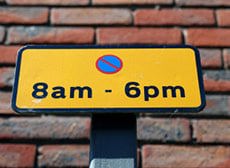
Myth: Single yellow lines have the same restrictions everywhere
Some motorists assume that yellow line restrictions are the same everywhere. For instance, they may believe that it’s legal to park on a single yellow after 6pm – a common time for councils to remove the restriction. However, the rules do vary and you should always check the accompanying sign – there are plenty of roads that restrict parking later or earlier than roads you may be familiar with.

Myth: Blue Badge holders can park anywhere
Parking rules are relaxed for Blue Badge holders, but they must still observe a number of key restrictions:
- Though single or double yellow lines can be parked on with a Blue Badge, the maximum time is three hours
- Obviously, many double yellows exist for everyone’s safety: it wouldn’t be advisable or desirable to park on double yellows at a junction, and only in extreme cases would such a manoeuvre be legally permissible
- If a single or double yellow line specifically restricts loading and unloading, Blue Badge holders cannot park there
- In certain areas, Blue Badge holder parking bays have time restrictions
- On private land, Blue Badge holders enjoy no special permissions unless signage indicates otherwise
- Central London (including parts or all of Westminster, Kensington, Chelsea, Camden and the City of London) has its own, tighter parking concession rules
- Even when obeying all of the above restrictions, a Blue Badge holder must move their car if requested to by a traffic warden or police officer
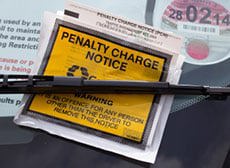
Myth: A parking ticket actually expires three minutes after its stated expiry time
Parking enforcement is sometimes said to have a ‘three minute amnesty’ on ticket expiry – the idea being that a warden’s watch could easily be a few minutes out. Again, this is one of those things that is technically true in some jurisdictions, but isn’t something that you should depend on. Consider:
- Some councils don’t operate the amnesty as a policy
- The availability of centrally controlled surveillance negates the margin of error
- If your watch is wrong too, there’s a good chance you’re going to be more than three minutes late
Looking to get on the road? Nationwide Vehicle Contracts is one of the UK's largest car leasing brokers and offers a range of lease deals to suit your every need.
If you want to get behind the wheel as quickly as possible, check out our in stock car lease deals which come with quick delivery usually within three to four weeks (may vary).
Guide Information
Originally published: 19th October 2015
Last updated: 5th October 2022
